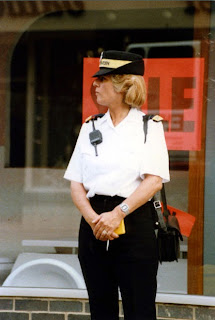On this date in 1960,
Traffic Wardens first patrolled the streets of London. Here are 10 things you might not know about traffic wardens.
- There were 40 traffic wardens that first day. Their uniforms had gilt buttons, Yellow shoulder flashes and yellow cap bands. Their average age was 50. Between them they issued 344 tickets. A parking fine in those days was £2.
- The first person to receive a parking ticket was Dr Thomas Creighton. He was also the first person to successfully appeal against one, because he was answering an emergency call at the time.
- They're not police, although in some areas they work on behalf of the police. Many are employed by councils or private companies. They will, however, co-operate with the police and report suspicious vehicles and anti-social behaviour.
- They're known in popular culture for being over-zealous. While most do their job sensibly, there have been reports of insensitive and even ridiculous ticketing. Hearses and ambulances are examples of insensitive ticketing. A warden in Yorkshire once slapped a ticket on a Horse belonging to a retired blacksmith. Under "vehicle description", the attendant had written "brown horse". In Manchester, a Rabbit hutch got a ticket. The pet shop owner had unloaded the hutch and put it outside his shop, then driven off so his van wouldn't get a ticket. “It's ridiculous,” the pet shop owner said. “It hasn't even got wheels."
- Motorists can be equally unreasonable, of course. Verbal and physical attacks and even death threats towards traffic wardens are common enough that wardens are sent on "conflict resolution classes" which include police guidance on calming angry motorists. Attacks against wardens reached a peak in 2007 when there were 21 attacks a month.
- With the best will in the world, a traffic warden can make a mistake. In 2008, 12,423 motorists appealed against parking fines. About 62% were successful. So what do you do if you get a ticket and you think the warden got it wrong? Don't punch them in the face, obviously. The advice is to tell the warden (calmly!) why you believe they are wrong, and ask him or her to write your comments down. Check the parking ticket and make sure it has the correct date on it, the correct registration and description of your car, and states the location of the offence. Also check whether there are clear signs stating the parking restrictions and that any yellow lines are clearly visible. Take photographs if need be. If it was at night, were the streetlights on? There's no point arguing with the traffic warden – it's the council's job to deal with your objection so write to them as soon as possible. Don't pay the fine and appeal later, because paying up is an admission of guilt, and you won't get it back.
- Some people think traffic wardens have targets to meet, which is why they can be over-zealous. Traffic wardens working for local councils don't have targets. The British Parking Association code of practice says “the practice of offering financial incentives relating to the quantity of parking charge notices in new and existing employee contracts is prohibited”. That said, wardens working for private companies to oversee their car parks, may not be members of the Association so they could have targets.
- In 2009 in England and Wales, 18,000 parking attendants, issued 4,035,555 parking tickets raising £267,761,347 in fines.
- Some people think you can avoid a ticket by driving away before the warden can slap the ticket on your vehicle, but if they've written the notice, they have your registration number and will track you down via the DVLA and send you the fine in the post. Another myth is that they have to observe your car for a period of time before they can issue a fine. If you've parked somewhere illegal or dangerous, that's an immediate fine, although if you're parked in a pay and display car park or on a meter, they are supposed to give you 10 minutes grace after the expiry time. People who are registered disabled may be able to park in more places, but they are not exempt from fines for illegal/dangerous parking and parking fees if the car park says they have to pay.
- The Beatles song, Lovely Rita, is about a female traffic warden.
More details about my books. Follow this link if you like Superheroes, Psychics and/or quirky short stories.
I've listed the themes each novel touches on here for easy reference.
Like my author page on Facebook for news on new books and blog posts.


No comments:
Post a Comment